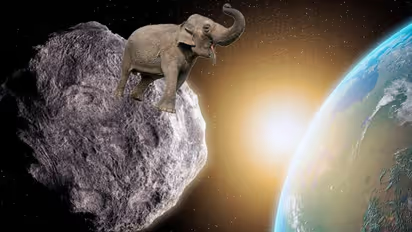Asteroid 2023 FM, 'the size of 90 elephants', speeding towards Earth; Check details

Synopsis
A huge asteroid the size of 90 elephants has been spotted hurtling towards Earth. The enormous space rock measures between 120m and 270m, meaning it could be taller than the Gherkin in London – or the size of up to 90 elephants.
After being discovered for the first time by NASA, a massive asteroid is now hurtling towards Earth. The meteor, named 2023 FM, is nearing our planet at eye-watering speeds of 15.8km/s and is set to come its closest on Thursday (April 6).
The huge space rock has a height range of 120 to 270 meters, making it as lofty as the Gherkin in London or as large as 90 elephants. However, despite the space rock's enormous size, it was only discovered on March 16 and its elliptical route was only just determined on April 2.
NASA is now monitoring the asteroid as it gets closer, but there's no need to get alarmed because it won't get much closer than 3,000,000 kilometers, or 0.02 astronomical units, to the Earth's surface.
Also Read | NASA to name 4 Artemis II Moon astronauts; When and where to watch live
Later this month, a much smaller asteroid, with a circumference of between 9 and 20 meters, is expected to approach Earth much more closely. 2023 FN13 is moving at a comparatively slower speed of 4.5km/s and will come just 0.0067 astronomical units, or 1,000,000km, from the Earth's surface.
And in even scarier news, one asteroid may be on track to "impact Earth" in the next twenty years. On Valentine's Day in 2046, the recently discovered asteroid 2023 DW may collide with the planet, but it is presently unknown precisely where it will strike and how much harm it may cause.
"We've been tracking a new asteroid named 2023 DW that has a very small chance of impacting Earth in 2046," according to a statement from NASA Asteroid Watch.
Also Read | Unbelievable! Thanks to AI, people could 'live on' after death as early as 2050; expert explains how